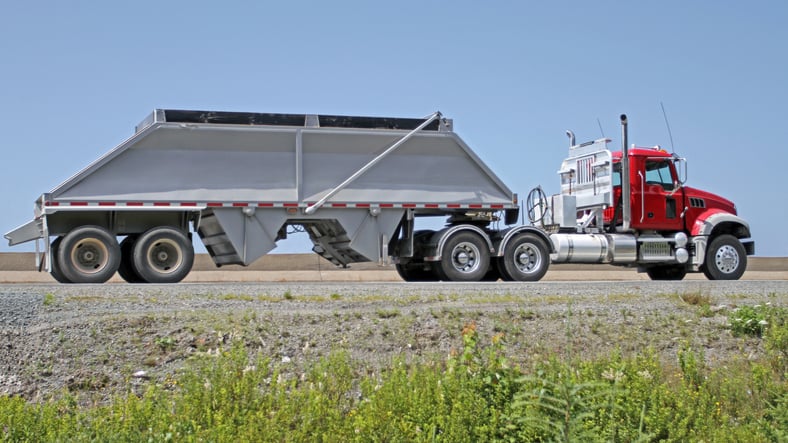achieving safe hauling - the importance of proper weight distribution
When it comes to trucking, proper weight distribution is a critical factor that directly impacts safety, stability, and efficiency. Whether you're...

In the world of construction, selecting the appropriate aggregate hauling equipment is crucial for ensuring a smooth and efficient transportation process. The right combination of trailers, trucks, and their sizes can significantly impact project timelines, costs, and overall productivity. In this blog post, we will explore the key factors to consider when choosing aggregate hauling equipment, examining various trailer types, truck options, and ultimately the benefits of using belly dump trailers.
Before diving into the specifics, it's essential to understand why selecting the right aggregate hauling equipment is crucial. Inadequate equipment can lead to delays, safety hazards, increased costs, and potential damage to materials during transportation. By investing time in making the appropriate choices, efficiency can be optimized, risks reduced, and overall project outcomes improved.
Let's explore the various truck options that power the aggregate hauling process with their strength and adaptability.
tandem axle trucks - versatile maneuverability
Tandem axle trucks also known as 4x2 trucks are one of the most common types of trucks used for aggregate hauling, especially in smaller to medium-sized jobs. They strike a balance between payload capacity and maneuverability, making them cost-effective and suitable for small to medium-sized projects. They are subject to certain weight restrictions on public roads due to the limited number of axles however, they navigate urban areas and tight construction sites with ease and are relatively affordable compared to other truck types.Considerations:
tri-axle trucks - increased payload capacity
Tri-axle trucks also know as 6x4 trucks are an intermediate option between tandem axle trucks and larger off-road trucks. They have three axles at the rear offering higher payload capacity, reducing the number of trips needed for larger projects. However, their maneuverability may be limited in congested or narrow roads.
Considerations:
off-road trucks - resilient on challenging terrain
Off-road trucks are heavy duty vehicles equipped with all-wheel drive and off-road tires, enabling them to navigate rough surfaces and challenging terrains effectively. They are capable of transporting large quantities in a single trip and have an impressive payload capacity. The design of off-road trucks provides ample ground clearance, allowing them to navigate over rocks, debris, and uneven ground effectively.
Considerations:
We will examine the diverse trailer types, each contributing unique advantages to the process of aggregate transportation.
end dump trailers - swift discharge efficiency
End dump trailers are the most commonly used trailers for aggregate hauling. They offer quick unloading through their hydraulic lifting mechanism, reducing wait times at construction sites and enhancing overall productivity. These trailers are suitable for an array of materials including sand, gravel, dirt, rock, dry and bulk.
Considerations:
side dump trailer - versatility & speed
Side dump trailers provide flexibility in material placement by unloading to the side. They are adept at handling large volumes of material swiftly, making them valuable assets for time-sensitive projects.
Considerations:
bottom dump trailers (belly dump trailers) - precision & efficiency combined
Bottom dump trailers impress with continuous and precise unloading from the bottom, making them ideal for confined spaces and situations that require accurate material placement. This trailer is particularly useful when working in confined spaces or when a precise spread of material is required.
Considerations:
Belly dump trailers offer several advantages that make them a preferred choice for many construction projects:
Expedited Unloading
The seamless continuous flow unloading system of belly dump trailers ensures swift material discharge, significantly reducing the waiting time at construction sites.
Pinpoint Material Placement:
The ingenious bottom discharge mechanism enables precise material placement, eliminating the necessity for additional manual spreading and enhancing overall efficiency.
Versatile Handling:
Embodying remarkable flexibility, belly dump trailers exhibit the ability to handle a diverse range of materials, rendering them suitable for various construction applications.
Safety Assurance
The meticulously controlled unloading process of belly dump trailers serves as a safeguard, effectively minimizing the risks of accidents and material spills, contributing to a secure work environment.
As we conclude our exploration of aggregate hauling equipment, we find that making informed choices is the key to success. Complexity and diversity harmonize to optimize efficiency, productivity, and safety during jobs. By understanding the diverse options of trucks and trailers available, we can navigate the complexities and ensure smooth aggregate hauling, contributing to the success of construction endeavors. Selecting the appropriate equipment depends on the specific requirements of your construction project, including payload capacity, terrain conditions, maneuverability needs, and budget considerations. By carefully assessing these factors, you can choose the right truck that optimizes efficiency and productivity for your aggregate hauling operations.
Stay tuned for upcoming blogs that will delve deeper!
Contact our team now to learn more and take your understanding to new heights.

When it comes to trucking, proper weight distribution is a critical factor that directly impacts safety, stability, and efficiency. Whether you're...

The collection, transfer and disposal of solid waste requires a significant investment in waste management equipment and vehicles, as well as the...

In the oil and gas industry, the secure loading and unloading of crude oil is extremely important. This critical process not only safeguards...